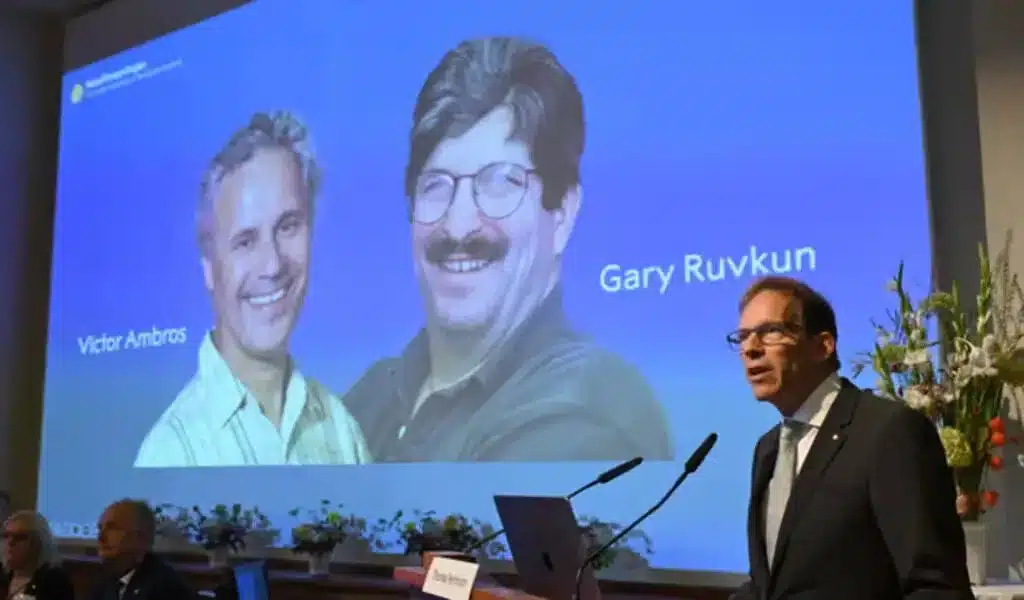World
Scientists Awarded MicroRNA The Nobel Prize in Medicine.

(VOR News) – For their research on small MicroRNA molecules that aid cells in modulating the proteins they produce, two scientists have been awarded the 2024 Nobel Prize in physiology or medicine.
Victor Ambros of the University of Massachusetts Medical School and Gary Ruvkun of Harvard Medical School and Massachusetts General Hospital have been awarded the prize for their discovery of microRNA and its role in post-transcriptional gene regulation.
The Nobel assembly at the Karolinska Institute in Stockholm, Sweden, disclosed the winners, who will divide an award of 11 million Swedish kronor, or approximately £810,000, equally.
Their research offered a unique perspective on the manner in which distinct traits and distinct proteins can be produced by various cells in our body, despite the fact that all of our cells possess the same DNA.
MicroRNA nerve and muscle cells serve specific functions.
For their research on small RNA molecules that aid cells in modulating the proteins they produce, two scientists have been awarded the 2024 Nobel Prize in physiology or medicine.
Victor Ambros of the University of Massachusetts Medical School and Gary Ruvkun of Harvard Medical School and Massachusetts General Hospital have been awarded the prize for their discovery of microRNA and its role in post-transcriptional gene regulation.
The Nobel assembly at the Karolinska Institute in Stockholm, Sweden, disclosed the winners, who will divide an award of 11 million Swedish kronor, or approximately £810,000, equally.
Their research offered a unique perspective on the manner in which distinct traits and distinct proteins can be produced by various cells in our body, despite the fact that all of our cells possess the same DNA. For example, nerve cells and muscle cells are highly specialized to serve specific functions.
In the early 1990s, the two independently identified a distinct mechanism and published crucial research while working with a small roundworm species known as C.elegans.
Their research revealed that microRNAs, which are short RNA segments, could directly attach to mRNA and prevent the machinery responsible for protein production from reading the instructions of the corresponding protein.
MicroRNA was once thought to be unique to C. elegans, according to Kämpe.
Nevertheless, additional microRNAs were identified in the years that followed, and it is currently believed that humans possess over one thousand genes that correspond to unique microRNAs.
It was later demonstrated by numerous research groups that microRNA can not only bind to mRNA and obstruct protein synthesis, but also induce mRNA degradation.
Additionally, there were additional discoveries. In accordance with Kämpe, “a robust system for gene regulation is created by each microRNA regulating several mRNAs and each mRNA being regulated by many distinct microRNAs.”
Ambros and Ruvkun have prior experience working together; they collaborated in Robert Horvitz’s laboratory during their postdoctoral studies. Horvitz was also a co-winner of the 2002 Nobel Prize in physiology or medicine.
Professor Venki Ramakrishnan, who was awarded the 2009 Chemistry Nobel Prize for his efforts in decoding the structure of the cell’s protein-generating apparatus, expressed his enthusiasm for the announcement.
This award, which has been long overdue, is well-deserved and illustrates the control that small RNAs can exert over the expression of specific genes in a variety of cell types.
“It will have far-reaching microRNA implications and could open a new area of biology.”
However, he added, “It is unfortunate that David Baulcombe’s lab, which along with Ambros and Ruvkun shared the 2008 Lasker award, discovered a similar phenomenon in plants, was not included in the prize.”
According to Thomas Perlmann, the Nobel assembly’s secretary general, Ruvkun was awakened on Monday morning. Perlmann was able to communicate with scientists in the United States.
Perlmann stated that he had not yet been able to contact Ambros; however, that “his wife answered, and it took a long time before he came to the phone and sounded very tired.” He was quite excited and happy when he understood what it was all about.”
“I trust that he will contact me in the near future.” “I left a message on his cell phone,” he declared. The 2024 Nobel Prize in physics will be announced on Tuesday, while the prize in chemistry will be announced on Wednesday.
SOURCE: TGN
SEE ALSO:
US Inflation will Comfort a Fed Focused on Labor Markets.
Harris Is Making A ‘Capitalist’ Pitch To Boost The Economy As Trump Pushes Deeper Into Populism




























